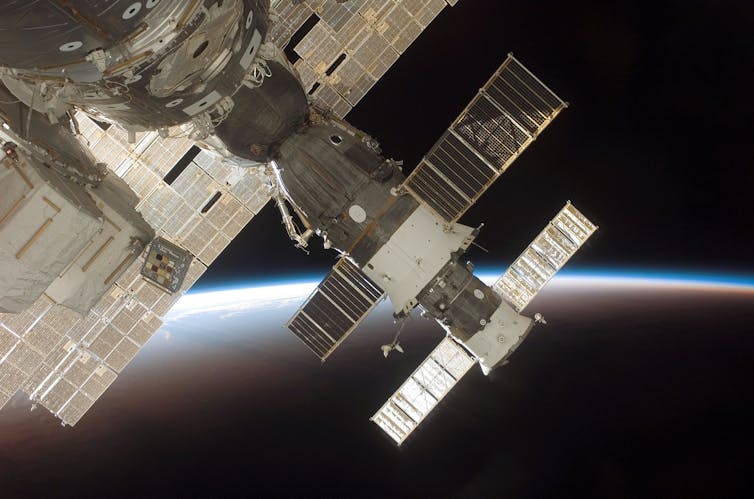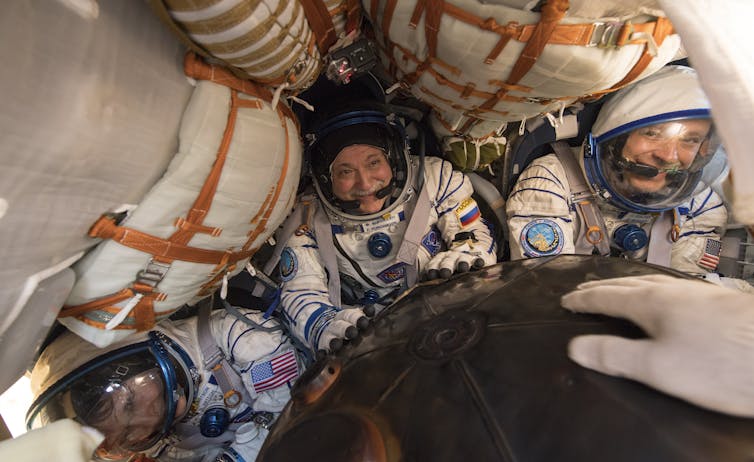Curious Kids: Do astronauts get space sick when they travel from Earth to the International Space Station?
- Written by Kevin Orrman-Rossiter, PhD Research Student, History & Philosophy of Science, University of Melbourne
This is an article from Curious Kids, a series for children. The Conversation is asking kids to send in questions they’d like an expert to answer. All questions are welcome – serious, weird or wacky!
Do astronauts get space sick when they travel from Earth to the International Space Station? – The students of class 3E, Ferny Grove State School, Brisbane.
This was a great question. If any of the students of class 3E get the opportunity to fly in space, just slap on an anti-nausea skin patch and go for it! Space sickness discomfort is real but if it happens to you, it will be short and you will remember the space voyage experience forever.
Yes, astronauts can get space sick travelling to the International Space Station. It is less likely travelling in the cramped Russian Soyuz spacecraft used to transport astronauts there now, than the old Space Shuttle that was used until 2011. The ability to move around in the Space Shuttle increased the chance of space sickness happening. Space sickness affects up to half of the astronauts during their first few days on the space station.
The idea of an astronaut barfing into their space helmet sounds funny, or embarrassing, at first. However, as astronaut Mike Mullane has said in his biography, it could be fatal - particularly if the astronaut was spacewalking. The vomit could smear the inside of the helmet, blinding the astronaut. And because it could not be removed, it could be inhaled or clog their oxygen circulation system.
 These days astronauts travel to the International Space Station via the Russian Soyuz spacecraft.
Flickr/NASA, CC BY
These days astronauts travel to the International Space Station via the Russian Soyuz spacecraft.
Flickr/NASA, CC BY
Read more: Curious Kids: Do bees ever accidentally sting other bees?
As you probably know, gravity is lower inside the International Space Station. Gravity is the force that pulls us down to the ground. The low gravity in space allows astronauts to float around, which looks very fun, but it can help cause space sickness.
Space sickness is nausea and disorientation felt by many astronauts. NASA uses the term “space adaption syndrome” instead of space sickness. It more closely describes the problem because it is an issue of the astronaut struggling to adapt to weightlessness in space. The cause of space sickness is still not fully understood.
Recent experiments show that space sickness is related to our inner ear. Two separate parts of the inner ear respond to rotation and sudden changes in direction. If you shake or move your head very quickly, you can get dizzy and some people may even feel sick. However, this normally passes very quickly.
Read more: Australia’s back in the satellite business with a new launch
This normal response is upset under low gravity - your inner ear thinks you are constantly moving. It takes some time to adapt to the new condition of weightlessness. It is made worse if you move your head while your body is still adapting. This is why previous astronauts travelling in the larger Space Shuttle were prone to space sickness more than the current astronauts travelling in the cramped Soyuz spacecraft – because in a confined space, the astronauts were less likely to move their heads around very much.
 Space sickness affects many, possibly up to half, of the astronauts the first few days on the space station.
NASA/Bill Ingalls
Space sickness affects many, possibly up to half, of the astronauts the first few days on the space station.
NASA/Bill Ingalls
Space sickness was not talked about in the early space missions. The original Mercury and Gemini spacecraft were, like the current Soyuz, cramped. It wasn’t until the Apollo and later missions that space sickness became of concern to NASA.
In 1983 the first detailed study was carried out aboard a Space Shuttle flight (STS-7) by astronaut-doctor Norm Thagard. His and all later studies were hampered by the astronauts themselves. None of them wanted to admit to being space sick. They were worried that mission control might remove them from space walking opportunities, or even worse, that they might not get included on later space missions.
Read more: Curious Kids: What started the Big Bang?
Hello, curious kids! Have you got a question you’d like an expert to answer? Ask an adult to send your question to us. You can:
* Email your question to curiouskids@theconversation.edu.au * Tell us on Twitter by tagging @ConversationEDU with the hashtag #curiouskids, or * Tell us on Facebook
 CC BY-ND
Please tell us your name, age and which city you live in. You can send an audio recording of your question too, if you want. Send as many questions as you like! We won’t be able to answer every question but we will do our best.
CC BY-ND
Please tell us your name, age and which city you live in. You can send an audio recording of your question too, if you want. Send as many questions as you like! We won’t be able to answer every question but we will do our best.
Authors: Kevin Orrman-Rossiter, PhD Research Student, History & Philosophy of Science, University of Melbourne





